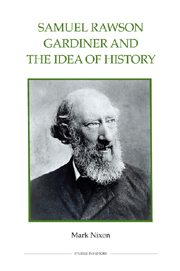Summary
‘Gardiner the antiquarian whose obsession for research crowds out the artistic sensibility exists principally in the imaginations of those admirers too respectful of his eighteen-volume opus to read it.’
Indeed, it may also be said to exist only in the imaginations of those detractors too disrespectful of his work to read it. And, of course, both admirers and detractors, fuelled by their failure to read Gardiner, imagine that his work can be characterised in simple terms – that is, according to the life of the writer.
This book has sought to provide a new way to understand the work of Samuel Rawson Gardiner. Traditional (‘contextualist’) approaches to historiography have sought to ‘discover’ in a historian's writings the ideological preoccupations of his or her political, religious or institutional lives. The historian's writings have been ignored in favour of biographical material. Thus, Gardiner has been viewed as the Liberal injecting Gladstonian principles into his analysis of the early Stuart, Civil war, Commonwealth and Protectorate periods, or the ex-Irvingite anglican whose religious sensibilities allowed him to take a unique perspective on the protestant/catholic battles of early modernity, or the scientific historian working in the shadow of the professionalisation and disciplinisation models then currently in vogue in English universities. Such accounts, however, rarely stand up to close scrutiny.
- Type
- Chapter
- Information
- Samuel Rawson Gardiner and the Idea of History , pp. 161 - 164Publisher: Boydell & BrewerPrint publication year: 2011

